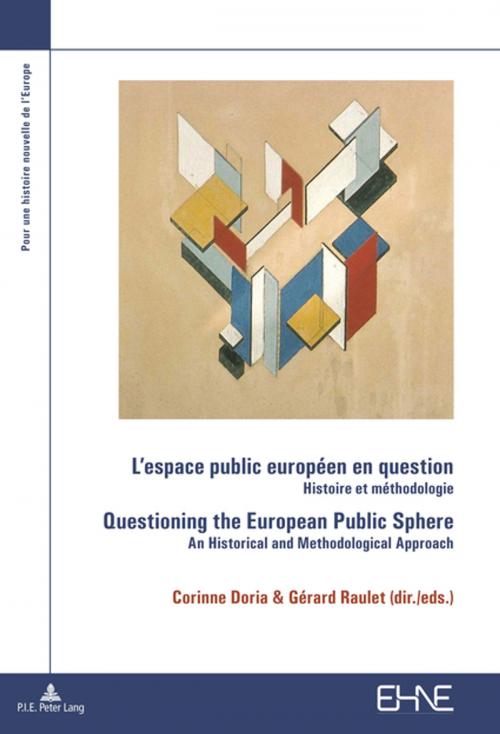Lespace public européen en question / Questioning the European Public Sphere
Histoire et méthodologie / An historical and methodological approach
Nonfiction, Social & Cultural Studies, Political Science| Author: | ISBN: | 9783035298093 | |
| Publisher: | Peter Lang | Publication: | April 1, 2016 |
| Imprint: | Peter Lang AG, Internationaler Verlag der Wissenschaften | Language: | English |
| Author: | |
| ISBN: | 9783035298093 |
| Publisher: | Peter Lang |
| Publication: | April 1, 2016 |
| Imprint: | Peter Lang AG, Internationaler Verlag der Wissenschaften |
| Language: | English |
Au cours des soixante dernières années, l’Europe s’est construite comme espace politique, juridique et économique. Mais ce processus n’a pas été accompagné par la construction d’un espace public européen, en dépit de la volonté de ses pères fondateurs, qui voulaient créer en Europe un espace culturel commun, reconnu comme tel par ses citoyens. À l’heure actuelle où, à travers internet et les réseaux sociaux, l’espace public européen est en train de se reconfigurer, le moment est venu d’une réflexion globale – à la fois historique et méthodologique – sur cet espace. Quand un espace public européen est-il apparu pour la première fois dans l’histoire ? Quels ont été les institutions, les événements, les évolutions qui, à partir du Moyen Âge, ont permis de concevoir et de percevoir l’Europe comme un espace commun – un espace public ? Comment, et par qui, a été occupé l’espace public en Europe aux différents moments de l’histoire ? Dans quelle mesure les découvertes géographiques et la rencontre avec d’autres cultures ont-elles renforcé la perception de l’Europe en tant qu’espace commun et public ? Comment l’espace public européen va-t-il se configurer dans l’avenir ? Le présent ouvrage rassemble les contributions de spécialistes (historiens, philosophes, historiens du droit, sociologues) au Labex EHNE, Écrire une Histoire Nouvelle de l’Europe.
Over the last sixty years, Europe has been built as a political, legal and economic space. Nevertheless, this process has not been accompanied by the construction of a European public sphere, despite the will of its founders, who wanted to create a European cultural area, recognized as such by its citizens. Now that, through the internet and social networks, the European public space is in the process of reconfiguring, it is time for a comprehensive reflection – both historical and methodological – on this space. When did a European public space appear for the first time in history? What were the institutions, events, developments from the Middle Ages, helped design and perceive Europe as a common sphere – a public space? How, and by whom, was occupied public space in Europe at different times in history? How geographical discoveries and encounters with other cultures have they strengthened the perception of Europe as a common and public? How will the European public space be set in the future? This book gathers essays from specialists (historians, philosophers, legal historians, sociologists) at Labex EHNE, Écrire une Histoire Nouvelle de l’Europe.
Au cours des soixante dernières années, l’Europe s’est construite comme espace politique, juridique et économique. Mais ce processus n’a pas été accompagné par la construction d’un espace public européen, en dépit de la volonté de ses pères fondateurs, qui voulaient créer en Europe un espace culturel commun, reconnu comme tel par ses citoyens. À l’heure actuelle où, à travers internet et les réseaux sociaux, l’espace public européen est en train de se reconfigurer, le moment est venu d’une réflexion globale – à la fois historique et méthodologique – sur cet espace. Quand un espace public européen est-il apparu pour la première fois dans l’histoire ? Quels ont été les institutions, les événements, les évolutions qui, à partir du Moyen Âge, ont permis de concevoir et de percevoir l’Europe comme un espace commun – un espace public ? Comment, et par qui, a été occupé l’espace public en Europe aux différents moments de l’histoire ? Dans quelle mesure les découvertes géographiques et la rencontre avec d’autres cultures ont-elles renforcé la perception de l’Europe en tant qu’espace commun et public ? Comment l’espace public européen va-t-il se configurer dans l’avenir ? Le présent ouvrage rassemble les contributions de spécialistes (historiens, philosophes, historiens du droit, sociologues) au Labex EHNE, Écrire une Histoire Nouvelle de l’Europe.
Over the last sixty years, Europe has been built as a political, legal and economic space. Nevertheless, this process has not been accompanied by the construction of a European public sphere, despite the will of its founders, who wanted to create a European cultural area, recognized as such by its citizens. Now that, through the internet and social networks, the European public space is in the process of reconfiguring, it is time for a comprehensive reflection – both historical and methodological – on this space. When did a European public space appear for the first time in history? What were the institutions, events, developments from the Middle Ages, helped design and perceive Europe as a common sphere – a public space? How, and by whom, was occupied public space in Europe at different times in history? How geographical discoveries and encounters with other cultures have they strengthened the perception of Europe as a common and public? How will the European public space be set in the future? This book gathers essays from specialists (historians, philosophers, legal historians, sociologists) at Labex EHNE, Écrire une Histoire Nouvelle de l’Europe.















